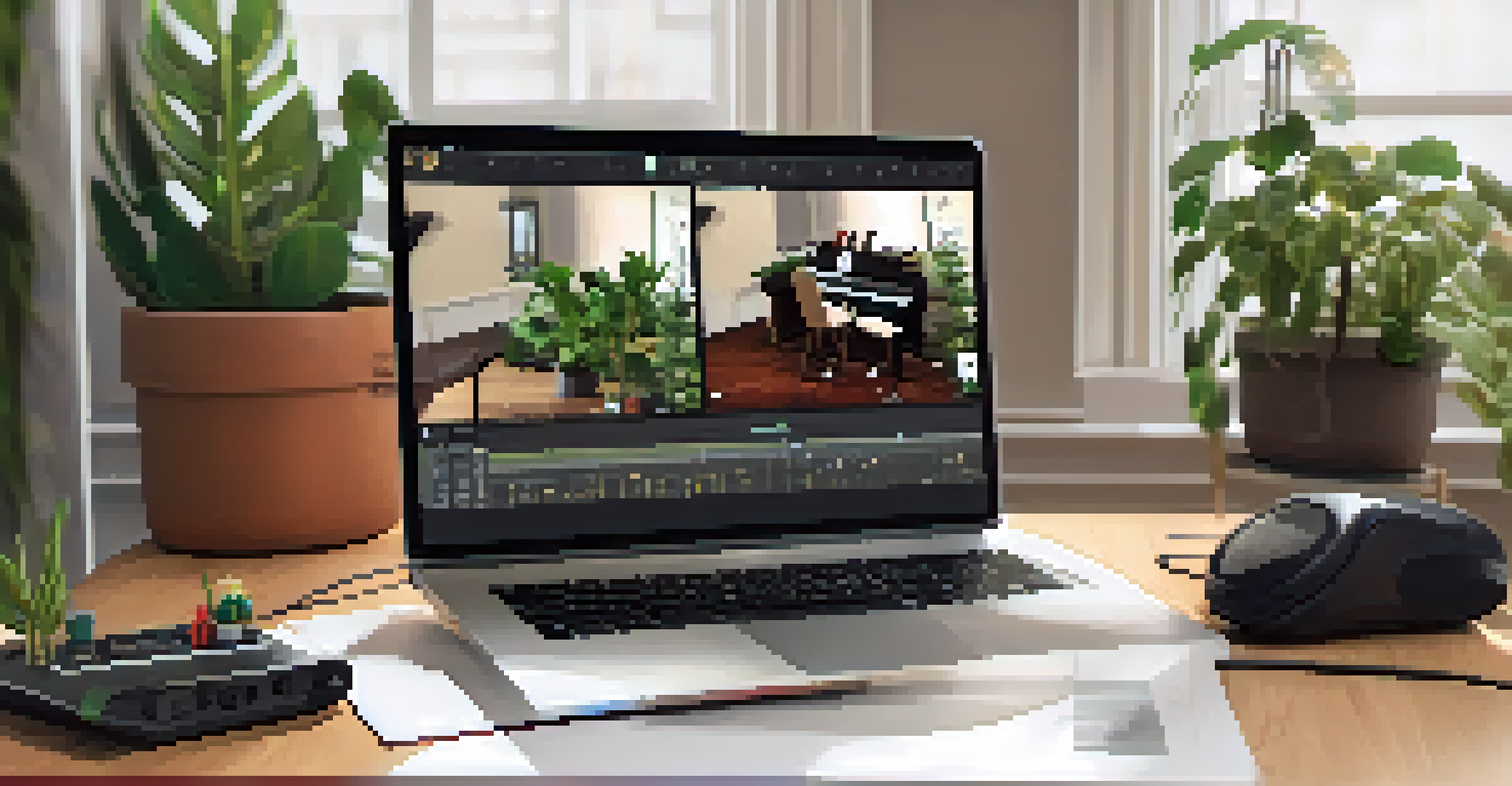Virtual Guitar Lessons: Pros and Cons for Learners

Understanding Virtual Guitar Lessons: A Quick Overview
Virtual guitar lessons have surged in popularity, especially in recent years. With the rise of technology and the internet, learning to play the guitar from home has become more accessible than ever. These lessons often utilize video conferencing tools, providing real-time interaction between teachers and students, making it feel like a face-to-face experience.
The beauty of learning online is that you can take the world’s best instructors and bring them into your living room.
For many, the convenience of learning from home is a game-changer. You can schedule lessons around your daily routine, eliminating travel time and costs. Plus, you have the freedom to choose from a wide range of instructors from around the world, each with unique teaching styles and specialties.
However, it's essential to understand how virtual lessons differ from traditional in-person lessons. While the core principles of guitar playing remain the same, the digital format can influence aspects like personal interaction and immediate feedback. This article will explore both the pros and cons to help you decide if virtual lessons are right for you.
Pros: The Benefits of Learning Guitar Online
One of the most significant advantages of virtual guitar lessons is flexibility. You can learn at your own pace and adjust your schedule to fit your lifestyle, which is particularly beneficial for busy individuals. This flexibility also extends to choosing lesson times that align with your peak learning hours, whether you're a morning person or a night owl.

Another perk is the access to a diverse range of instructors. With virtual lessons, you’re not limited to local teachers; you can learn from experts in different genres or styles, enhancing your musical repertoire. This exposure can be incredibly enriching, offering you insights into techniques you might not encounter locally.
Flexibility in Learning Guitar
Virtual guitar lessons offer the convenience of scheduling and learning at your own pace, making it ideal for busy individuals.
Furthermore, online lessons often come with additional resources. Many instructors provide recorded sessions, sheet music, and practice exercises that you can revisit at any time. This can significantly enhance your learning experience, allowing you to practice concepts until you feel confident.
Cons: The Challenges of Virtual Guitar Lessons
Despite the many benefits, there are some challenges to consider with virtual guitar lessons. One notable drawback is the potential for technical issues, such as poor internet connection or software glitches. These interruptions can disrupt the flow of your lessons and may lead to frustration.
Practice does not make perfect. Only perfect practice makes perfect.
Another concern is the lack of physical presence. While video calls can mimic face-to-face interactions, nothing beats the direct feedback you receive in person. Some learners may find it difficult to adjust to visual cues alone, which can hinder their progress in mastering techniques.
Additionally, the absence of a structured environment can affect motivation. Without the accountability of a physical class, some learners may struggle to stay focused or dedicated to their practice. It's crucial to establish a disciplined practice routine to maximize the benefits of online learning.
How to Choose the Right Virtual Guitar Instructor
Selecting the right instructor can significantly impact your learning experience. Start by identifying your musical goals—whether you want to learn basic chords, master advanced techniques, or explore a specific genre. This clarity will help you find an instructor who aligns with your aspirations.
Once you have a clear goal, research potential instructors. Look at their qualifications, teaching style, and student reviews. Many instructors offer introductory lessons, which can be a great way to gauge compatibility before making a long-term commitment.
Challenges of Online Learning
Technical issues and the lack of physical presence can impact the learning experience, requiring self-discipline to stay motivated.
Don’t hesitate to ask questions during your initial interactions. This could be about their teaching methods, lesson structure, or how they handle different learning speeds. A good instructor will be happy to discuss their approach and ensure you feel comfortable before diving into lessons.
Creating an Ideal Learning Environment at Home
Your learning environment plays a crucial role in your success with virtual guitar lessons. Setting up a dedicated space for practice can help minimize distractions and create a sense of focus. Ideally, this space should be quiet, well-lit, and equipped with all the necessary tools, like your guitar, a tuner, and any materials your instructor provides.
Consider investing in good audio and visual equipment. A quality microphone and camera can enhance the experience for both you and your instructor, ensuring clear communication and feedback. This attention to detail can make a significant difference in how effectively you learn online.
Lastly, make it a habit to prepare for your lessons. This means having your guitar tuned, your materials ready, and any questions you want to ask written down. By entering each lesson prepared, you’ll maximize the time spent with your instructor and foster a more productive learning experience.
The Importance of Consistent Practice in Online Learning
Consistency is key when it comes to mastering the guitar, regardless of whether you’re learning online or in person. Establishing a regular practice schedule can help reinforce the concepts you learn during your virtual lessons. Aim for short, focused practice sessions several times a week rather than cramming all your practice into one long session.
One effective strategy is to set specific goals for each practice session. For instance, you could focus on mastering a new chord, improving your strumming technique, or learning a section of a song. Having clear objectives will keep your practice sessions engaging and purposeful.
Choosing the Right Instructor
Selecting an instructor that aligns with your musical goals and teaching style is crucial for a successful online learning experience.
Additionally, consider recording your practice sessions. This not only allows you to track your progress over time but also gives you the opportunity to identify areas that need improvement. Reflecting on your recordings can provide valuable insights and boost your motivation as you witness your growth.
Final Thoughts: Weighing Your Options for Guitar Learning
In conclusion, virtual guitar lessons offer a unique blend of convenience and flexibility that appeals to many learners today. They allow you to connect with talented instructors worldwide, customize your learning experience, and potentially access a wealth of resources. However, it’s essential to weigh these advantages against the potential challenges, such as technical issues or the need for self-discipline.
Ultimately, the decision to pursue virtual lessons should align with your learning style and goals. If you thrive in structured environments and require immediate feedback, traditional lessons might be more beneficial. Conversely, if you appreciate flexibility and enjoy self-paced learning, online lessons could be your perfect fit.

Remember, the journey to mastering the guitar is personal and unique for everyone. Take the time to explore your options, find what works best for you, and enjoy the process of making music!